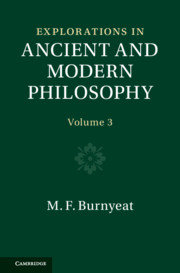Book contents
- Explorations in Ancient and Modern Philosophy
- Explorations in Ancient and Modern Philosophy
- Copyright page
- Contents
- Illustrations
- Preface
- Acknowledgements
- Abbreviations
- Introduction
- Part I The Republic
- Chapter 1 Plato on why mathematics is good for the soul
- Chapter 2 Long walk to wisdom
- Chapter 3 The truth of tripartition
- Chapter 4 Plato and the dairy-maids: the distribution of happiness inside and outside the ideal city of the Republic
- Chapter 5 Justice writ large and small in Republic IV
- Chapter 6 Fathers and sons in Plato’s Republic and Philebus
- Chapter 7 By the Dog
- Chapter 8 Culture and Society in Plato’s Republic
- Part II The past in the present
- Appendix: The archaeology of feeling
- Bibliography
- Index locorum
Chapter 1 - Plato on why mathematics is good for the soul
from Part I - The Republic
Published online by Cambridge University Press: 24 March 2022
- Explorations in Ancient and Modern Philosophy
- Explorations in Ancient and Modern Philosophy
- Copyright page
- Contents
- Illustrations
- Preface
- Acknowledgements
- Abbreviations
- Introduction
- Part I The Republic
- Chapter 1 Plato on why mathematics is good for the soul
- Chapter 2 Long walk to wisdom
- Chapter 3 The truth of tripartition
- Chapter 4 Plato and the dairy-maids: the distribution of happiness inside and outside the ideal city of the Republic
- Chapter 5 Justice writ large and small in Republic IV
- Chapter 6 Fathers and sons in Plato’s Republic and Philebus
- Chapter 7 By the Dog
- Chapter 8 Culture and Society in Plato’s Republic
- Part II The past in the present
- Appendix: The archaeology of feeling
- Bibliography
- Index locorum
Summary
Why does Plato in the Republic attach such importance to mathematics? Not for its practical utility, nor for the transferable skills acquired by the mathematician, nor because of the rigour of the formal procedures of mathematical proof. It is rather that the five mathematical sciences described and explained in Book VII convert the soul from merely human perspective, and tell us how things are objectively speaking. Their content is what counts. They convey knowledge or understanding of the context-invariant truth of unqualified reality. In contrast with modern conceptions of mathematics and its relation to reality, these sciences are conceived as themselves sciences of value. Above all, they enlarge ethical understanding. Crucial here is harmonics, which incorporates principles first studied through the first four sciences that Plato specifies. Mathematical proportion is what underpins the musical structures – the concords – that form the subject matter of harmonics. Such mathematical structures, when internalised by the philosopher, function as abstract schemata for applying their knowledge of the Good in the social world. Plato values them so highly because they create and sustain unity: unity is for him the highest value.
Information
- Type
- Chapter
- Information
- Explorations in Ancient and Modern Philosophy , pp. 5 - 72Publisher: Cambridge University PressPrint publication year: 2022
